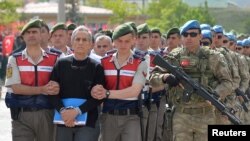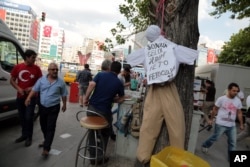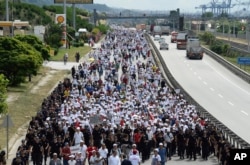Saturday marks the first anniversary of Turkey's failed coup against President Recep Tayyip Erdogan, but with a post-coup crackdown firmly in place, there are concerns about a deepening political divide as the government marks the turmoil.
Turkish media broadcasts of the tumultuous events of July 15, 2016 include file coverage of soldiers opening fire on unarmed people on Istanbul’s Bosphorus Bridge and jets bombing parliament. More than 240 people were killed and nearly 3,000 others were injured when a faction of the military attempted to seize power.
Watch: Turkey Marks First Anniversary of Failed Coup
“The soldiers took out their rifles and started shooting. At that moment, I totally lost it. I was so furious because I wasn't expecting anything like this from them,” recalls 50-year-old Mehmet Akyol, sitting with his wife and children. “I went down to the street. I was just about to lift my arm and shout at them. And then I saw blood running down my wrist. And I noticed that my wrist was shattered.
“I would have been devastated if I hadn't gone out into the street. My children would have questioned why I hadn't tried to take a stand during this terrible situation,” added Akyol.
Akyol, like those who resisted the coup, is being remembered by President Erdogan and his government in broadcast accounts. Large posters of people standing up against the military coup adorn billboards in Turkey’s main cities and towns.
Turkey remains under a state of emergency, with more than 60,000 people jailed and 140,000 removed from their jobs. Many are accused of being members of FETO, the name given by the government to followers of U.S.-based Turkish cleric Fethullah Gulen, who the government blames for the coup attempt. Gulen has denied involvement. The state of emergency allows Erdogan and his Cabinet to issue decrees without parliamentary approval or judicial review.
“The whole world should know this: This struggle will continue until there is not a single FETO member left who has not paid the legal price of their betrayal,” Prime Minister Binali Yildirim said Wednesday. “There's no doubt we have to take further steps in the fight against the FETO terror organization. The struggle will continue with determination. What I want from my nation is for it not to lose faith in this struggle and to continue supporting us.”
The appeal for support was made as the government faces mounting criticism over the crackdown and accusations it is trying to silence its critics.
“Actually it (the coup) was life-changing. A week later, I was suspended from university. Because what I did was retweet some very peaceful tweets, including being against capital punishment and the call for the government to be in accordance with the rule of law,” recounts law professor Istar Gozaydin.
The prominent rights advocate is one of more than 6,000 academics who lost their jobs in the ongoing purge; but for Gozaydin, being fired was just the beginning.
“In December, there was a knock at the door. I was detained and arrested; the allegation -- being a member of an armed terrorist organization, so it's maybe up to 22 years ((in jail)). I have no prediction for trial as being somebody educated in law, in normal circumstances I would say that I would be acquitted; however, we are not in a period of rule of law, it's a very political climate; it depends on the political climate...”
Gozaydin’s lawyers say the only evidence against her is a television interview in which she argued that only a court can determine whether a person is a terrorist. Human Rights activists says there are tens of thousands of similar cases in Turkey.
In May, Amnesty International described the dismissal of public sector workers in Turkey as "professional annihilation," adding, "It has had a catastrophic impact on their lives and livelihoods."
Earlier this month, 10 senior local representatives for international human rights organizations, including Amnesty and The Helsinki Citizens Assembly, were detained while attending a meeting near Istanbul. Authorities allege the representatives were conspiring against the government.
On Sunday, Kemal Kilicdaroglu, leader of the main opposition Republican People’s Party, completed a nearly month-long justice march from the capital, Ankara, to Istanbul, where fellow parliamentary deputy and close ally Enis Berberoglu is serving a 25-year prison sentence on charges of releasing state secrets. An estimated 1.5 million people turned out in support of Kilicdaroglu after the march.
“After the coup attempt of July 15, there has been a very big consensus for democracy in the people,” Kilicdaroglu told VOA. “But on July 20 (2016), with the introduction of the decree for the state of emergency, there was a civil coup. All the negative outcomes of this civilian coup came one after the other. MP's and journalists arrested. Academics were dismissed from their positions; 140,000 state personnel were fired from their jobs.”
Erdogan has labeled Kilicdaroglu a supporter of terrorism.









